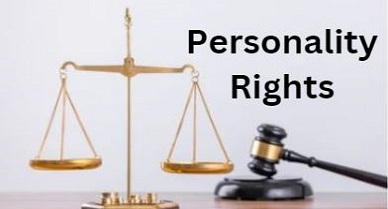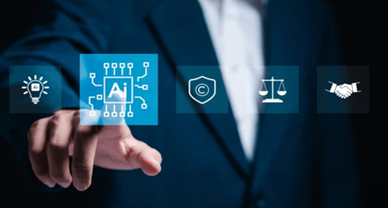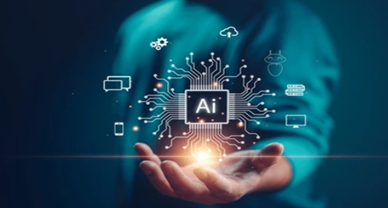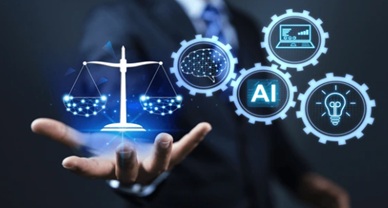Anil Kapoor Vs Simply Life India & Ors: An Unwavering Assurance In Safeguarding Personality Rights Against Ai
ABSTRACT
There has been a dramatic increase in the commercial use of celebrity personalities by people not authorized to do so compared to the earlier times. Protecting personality rights has become a growing problem in India due to deepfakes, morphed pictures, etc . Despite the judiciary’s efforts to address the concerns under current intellectual property laws like copyright and trademark, the absence of relevant and specific provisions for the protection of personality rights has started to pose a serious threat. In between these problems came Delhi High Court’s judgement in favour of Anil Kapoor wanting to get personality rights. This judgement recognized the growing misuse of persona for commercial use in The Era of Emerging AI . This Blog intends to shed light on the judgement given by court and if the current legal framework is sufficient to address the difficulties of personality rights in this present conditions
INTRODUCTION
Are you one of those who bought a t-shirt from an unknown online vendor with a cartoon version of your favourite celebrity or some of their famous lines emblazoned?
I bet you didn’t realise that these websites profit from selling you these things illegally? It’s something that most of us have done at some point. Without meaning to, we have all contributed to the infringement of another person’s rights
Recently “just Looking Like A wow” trend got viral among people and everyone started using it either for business purposes or to gain personal benefits via social media , if the owner of the one-liner becomes a famous public figure because of her way of speaking (which she has become now ) and gets widely recognised then she can also file for protection of her persona , if the one liner / way of speaking she used acts as a medium to provide for her livelihood as well then she has the right to decide when and how it will be used and can also sue people . Interesting right? Let’s give you some insights as to What constitutes such infringement, what can be done against this, and the relevant laws governing such situations .
PERSONALITY RIGHTS
In this day and age of endorsement deals and tabloid speculations, it is crucial for celebrities to protect their rights and reputations. In light of the growing number of instances involving deepfakes, image infringements ,India must quickly put its legal framework in place to regulate the commercial use of celebrities.
[Image Sources: Shutterstock]
Now the question is what is personality rights or celebrity rights ? A celebrity is someone who is widely known and recognised and personality rights is The absolute right of a celebrity/famous personality to have the power to control and limit or prohibit the unauthorised use of their resemblance, name, physical appearance, way of speaking , pronunciation or voice and other aspects of their personality for both commercial and non-commercial use .
While the Constitution does not explicitly mention personality rights, In the case of Judge K.S. Puttaswamy v. Union of India[1], established that privacy is an essential Fundamental right under Article 21 of the Constitution. Unauthorised use of someone’s identity is a violation of both their personality rights and their basic right to privacy. Privacy is the entitlement to be free from intrusion and and is a continuation of personal freedom.
In an effort to fool people and profit from the use of celebrities’ names and pictures, deepfakes portraying fictional events that never occurred have been utilised against popular personalities. Impersonation through digital means is become increasingly believable and accurate. This has increased in celebrities moving to court to get rights over their persona . The most recent and promising Judgement came in ANIL KAPOOR VS SIMPLY LIFE & ORS[2]. It is a significant advancement in the field of personality rights since it protects actor Anil Kapoor’s distinctive personality and personal qualities against exploitation, particularly when it comes to Artificial Intelligence techniques used to fabricate deepfakes.
Brief facts of the case
A number of legal claims were made by the plaintiff, Anil Kapoor, including rights to personality, protection under copyright for dialogues like “jhakaas”, his tone and related works, and also rights to dilution, unfair competition, and passing off. For every one of the twenty-one defendants, the plaintiff provided examples.
All of the defendants, according to the plaintiff, are using different aspects of the plaintiff’s identity in some way and abusing them in harmful ways, such as
- supplying digital stickers with the plaintiff’s picture and receiving payment for them;
- using his name and pictures for posters;
- selling t-shirts using the plaintiff’s name and appearance;
- giving out fake signatures and pictures of the plaintiff;
- Using artificial intelligence, deepfakes of the plaintiff are created that are incredibly offensive to other actresses, such as Katrina Kaif, Madhuri Dixit, and the late Sridevi. The plaintiff’s face is morphed with these actresses’,
- Using artificial intelligence, cartoon images of the plaintiff are created; Putting GIF images of the plaintiff on social media handles;
- domain names, such as www.anilkapoor.in, www.anilkapoor.net, and www.anilkapoor.com to mislead the general public
Arguments by counsel for plaintiff
Anil Kapoor claimed that the Defendants had unfairly utilised his persona, hurting his interests, family life, reputation, right to livelihood, and right to live with dignity. The Plaintiffs cited foreign court rulings, such as Bette Midler v. Ford Motor Company [3] which established a tort under the Copyright Act if a celebrity’s recognised and distinctive voice was used by a seller to sell a product by fraudulently asserting that something belonged to them when it did not .
The Plaintiff also referenced Vanna White v. Samsung Electronics America [4] which examined whether using someone’s identify without consent infringed their privacy. The Court rejected the privacy defence, which is often employed in IP proceedings. Instead, it ruled that celebrities have the right to profit on their popularity in whatever way they want and that the right of publicity protects their financial interest in their identities.
The lawsuit argued that the “Prevention and Regulation of Dark Patterns, 2023” would protect consumers against “dark patterns.” Dark patterns are deceptive tactics or design patterns that impair people’s autonomy, decision-making, or choice to force them to do something. Consumer rights abuses, deceptive advertising, and unfair commercial practices are examples. The complaint claims that artificial intelligence-created deepfakes of Anil Kapoor and his name-branded websites defraud customers.
Judgement of the court
Fame, as the Honourable Justice noted, can have negative outcomes, including the erosion of people’s rights to privacy, a way of life, and social dignity. Although she recognised the value of free expression, she made it clear that it would be strictly prohibited if someone’s reputation or other connected traits were unfairly damaged.
Citing the Supreme Court’s ruling in the AUTO SHANKAR CASE (R. Rajagopal v. State of Tamil Nadu[5]), the court ruled that the plaintiff’s rights must be protected against any potential compromise, or ambiguity. No court will turn blind way when someone steals the identity of another individual and uses their name or related personality features.
According to the court, using Anil Kapoor’s name in any form, including but not limited to GIFs, ringtones, domain names, or merchandise, is illegal. Next, Judge Prathiba M. Singh emphasised how a celebrity’s endorsement deals might be profitable for them. The illegal distribution and sale of t-shirts, magnets, keychains, mugs, stickers, and masks featuring a celebrity’s picture, face, or other connected qualities should not, she emphasised, totally strip these rights of their protection.
celebrities livelihood also depends on their popularity and endorsements and any unfair practices will take away their livelihood and violate their fundamental rights
Current applicable Laws
Although the Copyright Act does not specifically address personality rights, the court may, in some circumstances, utilise copyright law to safeguard the personality right. However, it may be more appropriate to consider trademark law as a comparable framework for comprehending the extent of the personality right. Specific provisions under the Copyright Act can offer an effective solution for addressing the violation of personality rights.
Famous people may now trademark their voices/Tone signatures/body movements/ names/ dialogues and other features thanks to the Trademark. Act, 1999.. The utilisation of first names and depictions or representations is restricted by Section 14 of the Trademark Act. Anyone engaging in the unauthorised exploitation of a celebrity’s name or misrepresentation shall face consequences under this section of the law.
The key provisions employed in copyright law include Section 2(qq), which provides a definition of a performer and clarifies whether personality falls within the scope of a performer; and Section 38, which allows for the enforcement of performer rights and effectively prohibits the unauthorised commercialization of a performance
Protection under Section 57, which is grounded on moral right, may also be applied in specific circumstances. Furthermore, in a handful of other instances, such as the case of Titan Industries Ltd. v. Ramkumar Jewellers[6], the court seems to have utilised Section 17(b). The allegation in this case was that the defendant had billboards showcasing the renowned Indian celebrities Jaya Bachchan and Amitabh endorsing the defendant’s diamond company. The plaintiff filed the defence of personality rights infringement based on the contract that allocated the personas to them. Furthermore, the plaintiff initiated legal proceedings to prohibit the unauthorised use of copyrighted material, unauthorised exploitation of personal rights, and compensation for damages caused by misrepresentation.
Defences against claims of personality rights
Legal safeguards and limitations on assertions regarding personal identity can act as defences like Using the names of famous celebrities is acceptable as long as it does not suggest any association with the person in question. In the legal case of Gautam Gambhir v. D. A. P[7]., it was argued that the defendant’s name was exactly the same as that of the famous cricket player. The accused individual had developed dining establishments titled “Play Reloaded by Gautam Gambhir” and “Blu Wavs by Gautam Gambhir.” The court ruled that the cricket player’s image rights were not violated since individuals have the right to conduct their business under their own name, as long as they do not engage in any activities that might cause confusion with another person’s business, and as long as they do so in good faith.
The business practice of using a celebrity’s image to sell things or services in order to make more money. This is called personality merchandising or ” marketing of one’s persona.
CONCLUSION AND SUGGESTIONS
Though court rejected the privacy defence used in anil Kapoor’s case , I strongly believe that privacy and publicity in their own ways two facets of personality rights . Shakespeare’s utopian visionary quote “what’s kept in a name”? when he believed a rose would smell like a rose regardless of its name. Rights are crucial in today’s competitive world of celebrities competing for fame and advertising.
Personality rights have been existing since a long time but there have been no particular laws , there have been instances where such rights were denied to people like in the year 2021 Sushant Singh Rajput’s father moved to court to get personality rights after his death where the court did not completely ruled in their favour.
Earlier cases of personality rights were done by individuals and not advanced tools Like AI where finding the main culprit is difficult. Personality rights Instances goes back to Shahrukh khan taking personality rights over his signature step that was displayed in the movie DDLJ and Recently in the case of Amitabh Bachhan vs Rajat Nagi[8] took personality rights over his image , voice , persona as these were used to mislead people in the name and pretext of KBC .
A precedent against the illegal commercial use of an individual’s identity will be set in motion by the rulings in the instances of Mr. Anil Kapoor and Mr. Amitabh Bachchan. Content made with Deepfake AI technology is abundant on social media sites; in fact, many producers exclusively use it for their work. As an example, a song was composed using the voice of the late singer Sidhu Moose Wala.
Personality marketing depends on the right of exposure, which is closely linked to privacy, defamation, copyright, and unfair competition laws. It’s becoming more and more important to use personality advertising in the modern business world. On the one hand, this is a great way to become famous, but on the other hand, people who become famous shouldn’t be able to trick people into buying bad goods or services. In order to do this, the law is changing to stop the unrestricted use of the right. copyright law isn’t suffice to handle more personality rights cases , it is necessary to insert provisions of personality rights into the constitution under a specific statute .
It is challenging to legalise rights to one’s personality or image. While some argue that the law shouldn’t be used to benefit the affluent and famous, others argue that the personality rights should exist .
In my opinion, intellectual property law need to provide explicit and thorough protection for personality rights. The popular, wealthy, and powerful will not be the primary beneficiaries of stronger intellectual property protection for image and personality rights. It takes a lot of hard effort to become a household star, but anti-image rights campaigners don’t care. True, the world sees a renowned person’s fame, but when that person’s reputation takes a hit, it’s only him or her who has to pay the price. thus, our legal system must to incorporate personality rights.
Author: Tanushree Behera, A Student at Symbiosis Law School, Pune, in case of any queries please contact/write back to us at support@ipandlegalfilings.com or IP & Legal Filing.
REFERENCES :
- Pusey, I., & Morgan, M. (2012). Celebrity Personality Rights in Jamaica: A Path for Development. Social and Economic Studies, 61(2), 99–125. http://www.jstor.org/stable/41803755
- Luthra, S. K., & Bakhru, V. (2019). PUBLICITY RIGHTS AND THE RIGHT TO PRIVACY IN INDIA. National Law School of India Review, 31(1), 125–148. https://www.jstor.org/stable/26918425
- Dogan, S. L., & Lemley, M. A. (2006). What the Right of Publicity Can Learn from Trademark Law. Stanford Law Review, 58(4), 1161–1220. http://www.jstor.org/stable/40040289
- Neethling, J. (2005). Personality rights: a comparative overview. The Comparative and International Law Journal of Southern Africa, 38(2), 210–245. http://www.jstor.org/stable/23252295
- PROTECTION OF PERSONALITY RIGHTS IN INDIA: ISSUES AND CHALLENGES, BY AGNES AUGUSTIAN, Volume I | Issue I | June 2023, pp. 44-53, https://www.nlunagpur.ac.in/PDF/Publications/5-Current-Issue/4.%20PROTECTION%20OF%20PERSONALITY%20RIGHTS%20IN%20INDIA.pdf
[1] Judge K.S. Puttaswamy v. Union of India AIR 2017 SCC 4161
[2] Anil Kapoor vs simply life & Ors Manu/Deor/248558/2023
[3] Bette Midler v. Ford Motor Company[849 F.2d 460 (1988)],
[4] Vanna White v. Samsung Electronics America [4][971 F.2d 1395 (1992)]
[5] R. Rajagopal v. State of Tamil Nadu 1994 SCC(6) 632
[6] Titan Industries Ltd. v. Ramkumar Jewellers 2012 SCC ONLINE DEL 2382
[7] Gautam Gambhir v. D. A. P[CS(COMM) 395/2017
[8] Amitabh Bachhan vs Rajat Nagi [CS(COMM) 819/2022



